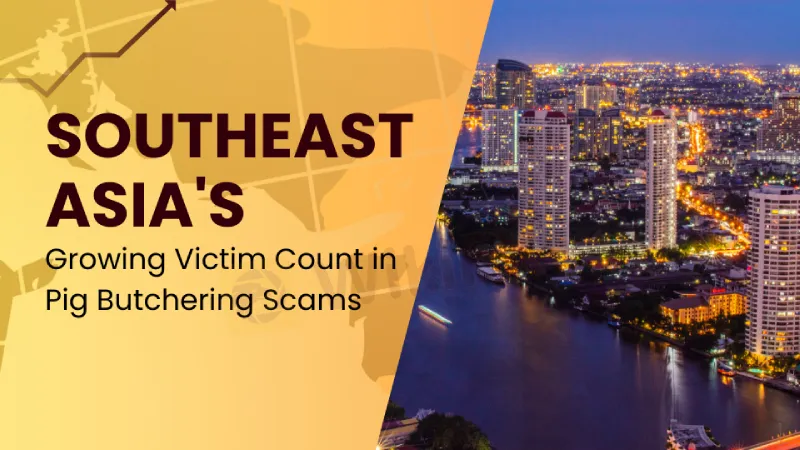简体中文
繁體中文
English
Pусский
日本語
ภาษาไทย
Tiếng Việt
Bahasa Indonesia
Español
हिन्दी
Filippiiniläinen
Français
Deutsch
Português
Türkçe
한국어
العربية
Southeast Asia's Growing Victim Count in Pig Butchering Scams
abstrak:Pig butchering scams are exploiting hundreds of thousands in Southeast Asia, forcing people into online fraud operations linked to Chinese Belt Initiative scams.

The Expansion of Online Fraud Operations in Southeast Asia
Online fraud schemes have quickly proliferated across Southeast Asia, with pig slaughter at the heart of this criminal wave. Over 200,000 individuals in Myanmar, Cambodia, and Laos have been unintentionally dragged into these activities and coerced to commit fraud at the hands of criminal groups.
What Is Pig Butchering Fraud?
Pig butchering schemes entail victim grooming, in which fraudsters gradually cultivate confidence before cheating them out of enormous quantities of money. Those forced to participate in these Southeast Asian frauds risk threats to their safety and their families' well-being. They are compelled to make calls, send messages, and contact prospective victims worldwide according to tight company directives. Many of these activities are powered by networks that stem from China's Belt and Road Initiative.
Chinese Belt Initiative and Its Links to Online Fraud
The Chinese Belt Initiative, an infrastructural project aiming to expand China's global influence, has seen several programs hijacked by criminal groups. Most of these organizations speak Chinese and have seized the initiative's resources to grow their fraudulent activities. Pig butchering scams were formerly limited to Southeast Asia but have now moved to West Africa, Latin America, Eastern Europe, and the Middle East.
The Global Impact of Scams Involving Pig Butchering
These scams have far-reaching implications, forcing victims to suffer financial and emotional harm all around the globe. The FBI said that these frauds took $4 billion in the United States alone last year, with worldwide losses estimated at $75 billion. Despite attempts to clamp down on these activities, particularly efforts by the Chinese government, the frauds continue to spread worldwide.
How Pig Butchery Fraud Works
Those engaging in pig butchering scams are often deceived and coerced. Scammers approach their prey using a variety of internet venues, masquerading as trustworthy persons. When they have acquired their victims' confidence, they convince them to invest or supply personal information, which is subsequently utilized to steal money or identities. Workers, who are often victims themselves, are charged with carrying out these fraudulent schemes for criminal organizations, emphasizing the human cost of these schemes.

Combating the Spread of Online Fraud
Governments and law enforcement organizations in Southeast Asia and other impacted areas are working feverishly to combat the spread of these frauds. However, due to the substantial financial incentives for fraudsters, these activities are showing no signs of diminishing. When faced with law enforcement, criminal organizations constantly change methods and relocate activities to other areas, making it difficult to destroy the networks responsible for these crimes completely.
The Role of Anti-fraud Organizations and Law Enforcement
Efforts to prevent pig butchering scams have increased throughout Southeast Asia and beyond, with anti-fraud agencies and non-governmental organizations (NGOs) actively spreading awareness about these crimes. Cross-border law enforcement authorities are working together to locate and destroy these networks. However, owing to the worldwide scope of these enterprises, combating pig butchering fraud remains a difficult and continuous effort.
The Need for Action in Southeast Asia
As Southeast Asia remains a key hotspot for internet fraud activities, concerted action is urgently required to avoid future exploitation of vulnerable persons. Stronger international coordination, public awareness, and improved cybersecurity measures are required to combat the spread of these frauds. We can only successfully confront the rising threat of pig butchering fraud by working together.
This article raises awareness of the alarming increase of pig slaughtering scams in Southeast Asia, emphasizing the necessity for worldwide action to prevent these damaging practices. Individual exploitation still fuels these activities; thus, measures must be taken to safeguard people at risk and bring down the networks involved.
How to Spot and Avoid Scams in Pig Butchering
Identifying Pig Butchering Scams
Pig butchering schemes, which sometimes require long-term victim grooming before scamming them, are difficult to detect. Unsolicited investment proposals, guarantees of profits, and fraudsters who cultivate confidence over time via social media or messaging applications are all red flags. Scammers often pressure victims to invest in fraudulent platforms, so properly researching any financial proposals is critical.
How to Avoid Scams During Pig Butchering
- Verify Investment Platforms: Always double-check its validity before investing cash in any investment site. If you are pressed to move fast or spend substantially, proceed cautiously.
- Research Contacts: If you are contacted by someone you don't know, double-check their identification and background. Scammers sometimes present themselves as competent specialists.
- Trusted Resources: To locate and verify genuine brokers and financial platforms, use applications such as WikiFX.
How WikiFX App Can Help
WikiFX is a financial software that provides detailed information on brokers and trading platforms to help users avoid fraud. WikiFX's collection of verified reviews and regulatory information helps users easily determine if a broker is reputable or engaged in fraudulent operations. This software protects users from falling prey to fraudulent schemes by providing information about broker histories, licenses, and user experiences, making it simpler to recognize frauds before participating.
Using WikiFX as a verification tool offers a first line of defense against online fraud schemes such as pig butchering fraud.
Stay protected from rising pig butchering scams in Southeast Asia. Learn more and stay informed on WikiFX News today!

Disclaimer:
Ang mga pananaw sa artikulong ito ay kumakatawan lamang sa mga personal na pananaw ng may-akda at hindi bumubuo ng payo sa pamumuhunan para sa platform na ito. Ang platform na ito ay hindi ginagarantiyahan ang kawastuhan, pagkakumpleto at pagiging maagap na impormasyon ng artikulo, o mananagot din para sa anumang pagkawala na sanhi ng paggamit o pag-asa ng impormasyon ng artikulo.
Broker ng WikiFX
Exchange Rate


